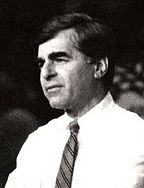| ‹ 1984 | ||||
| United States Presidential election, 1988 | ||||
|---|---|---|---|---|
| November 8, 1988 | ||||
| Turnout | 64.8% (voting eligible) | |||

|

|
|||
| Nominee | Ronald Reagan | Ted Kennedy | ||
| Party | Republican | Democratic | ||
| Home state | California | Massachusetts | ||
| Running mate | Phil Gramm | Jerry Brown | ||
| Electoral vote | 502 | 36 | ||
| States carried | 47 | 3+D.C. | ||
| Popular vote | 55,698,457 | 35,767,239 | ||
| Percentage | 59.1% | 40.2% | ||

| ||||
| Election results map. Red denotes states won by Reagan/Gramm (47), Blue denotes states won by Kennedy/Brown (three plus D.C.). | ||||
President before election
Ronald Reagan Republican
Elected President
Ronald Reagan Republican | ||||
The Election of 1988 was the 52nd quadrennial presidential election. It was held on Tuesday, November 8, 1988. The competition saw incumbent President and Republican Ronald Reagan run for a third term, as the 22nd Amendment had failed to pass in 1951. He defeated Senator Edward Kennedy of Massachusetts in another landslide victory, winning 502 electoral votes and 60 percent of the popular vote. No one had ever run for a third term since Franklin Roosevelt, and there were doubts about Reagan and his age. However, Reagan was helped by a booming economy and the now rapid decline of the Soviet Union. After an argument with Vice President George H. W. Bush about who would run (Bush was planning to run, but Reagan wanted a third term), Bush resigned and Reagan picked another Texan to be his running mate, Senator Phil Gramm. This would go down as the most lopsided third-term reelection since FDR in 1940. In the coinciding congressional elections, Republicans gained control of both houses of Congress, neither of which they would lose until the 1998 midterms.
Nominations[]
Republican Party Candidates:
- Ronald Reagan, President of the United States from California.
- George H. W. Bush, Vice President of the United States from Texas.
- Bob Dole, United States Senator from Kansas.
Toward the end of 1987, Reagan had announced his plans for a third term. However, there were many doubts, both about his age and the fact no one had run for a third term since FDR. Vice President George Bush had been planning to run, and he and Senator Bob Dole had many supporters among moderates who considered Reagan to be a far-right extremist. After Reagan announced his candidacy, Bush had resigned from the ticket to run against Reagan in the primaries. The primaries were long and harsh, as Reagan argued that he would lead the country to more greatness, as the Cold War was winding down and the economy was booming, while Bush argued that presidents should only be limited to two terms and Reagan was too much of a radical. In the end, Reagan was helped by the economy and the dying Cold War and won every single state except Texas and Bob Dole's home state of Kansas. He chose Senator Phil Gramm of Texas to be his new running mate.
Democratic Party Candidates:
- Ted Kennedy, United States Senator from Massachusetts
- Michael Dukakis, Governor of Massachusetts
- Jesse Jackson, Reverend and Civil Rights leader from South Carolina
- Mario Cuomo, Governor of New York
- Jerry Brown, former Governor of California
- Al Gore, United States Senator from Tennessee
- Joe Biden, United States Senator from Delaware
- Lyndon LaRouche, activist from Virginia
After losing in a massive landslide in the 1984 presidential election, the Democratic Party leaders were becoming desperate to find a candidate who could beat Reagan. They still controlled both houses of Congress, and were determined to use this control to win the presidency. From the beginning of the primaries the favorite was Massachusetts Senator, brother of deceased president John Kennedy, and 1980 Democratic candidate, Ted Kennedy. He, like Walter Mondale, advertised traditional New Deal-Great Society ideals and principles. His main opponent was another man from Massachusetts, Governor Michael Dukakis. Dukakis argued that the old New Deal-Great Society ideas had lost them the last election and they needed to provide a new image of the Democrats to the public. His campaign, however, suffered from many miscues, and Ted Kennedy's popularity as John F. Kennedy's brother won him the nomination in 35 out of 50 states. He chose fellow candidate Jerry Brown to be his running mate.
General Election[]
Although Reagan remained immensely popular, Kennedy appealed to the far-left who had not at all been happy the last eight years. He was a powerful orator, and he ran a hard campaign, trying to portray Reagan as a far-right extremist and convince people that Reagan had Alzheimer's. Reagan, for his part, utilized his own humor and speaking skills, portraying Kennedy as a typical big-government Democrat socialist and defending his own eight-year record as a leader. Although Kennedy won the first presidential debate, Reagan stomped all the others and Phil Gramm beat Jerry Brown in the Vice presidential debate.
Reagan was helped by a strong economy and the declining Cold War, and the Democratic vote was divided between the far-left and the moderate "Reagan Democrats," while Ted Kennedy attacked Reagan constantly and did not defend himself enough. When November 8 rolled around, the result was yet another Republican landslide. Reagan carried all but three states, and won 60 percent of the popular vote. Although less lopsided in the electoral vote that Reagan's 1984 victory, he still won it by a large amount, 502 votes to Kennedy's 36. In the simultaneous congressional elections, the Republicans took control of both the Senate and the House, neither of which they would lose until the 1998 midterms, solidifying their status as a majority party. This election marked the beginning of a large shift of U.S. politics to the right wing.






